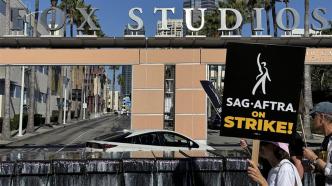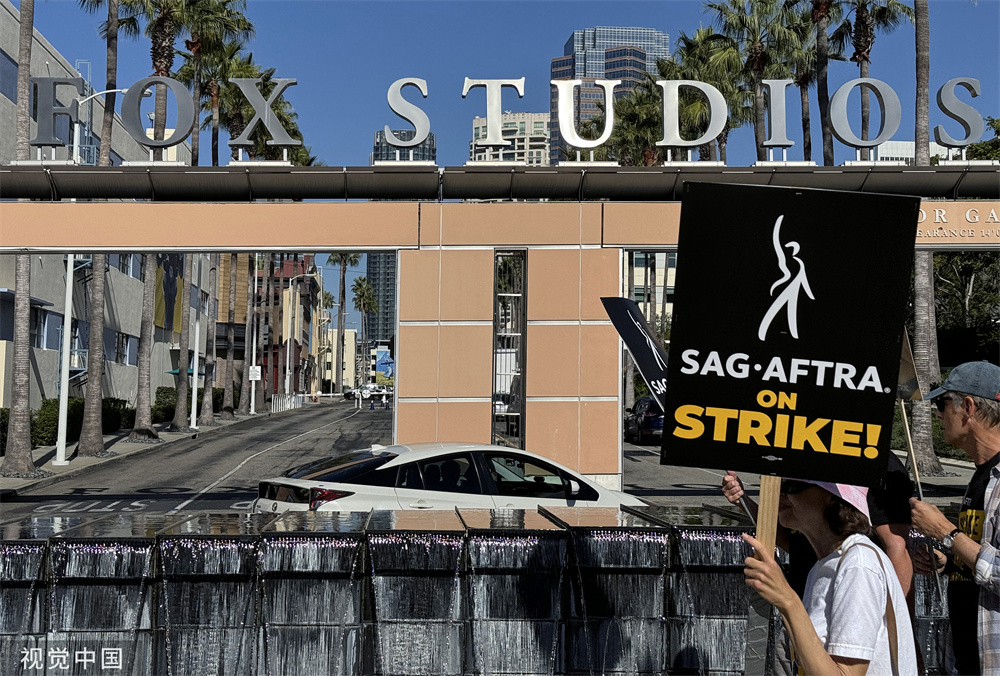
Late at night on October 11th local time in the United States, the American Alliance of Motion Picture and Television Producers (AMPTP), which represents the interests of employers, issued a statement stating that the new round of negotiations with the Screen Actors Guild had completely collapsed, and that the two sides were "very far apart" on key issues. During the day on October 12, a parade of striking actors reappeared outside the office buildings of major film and television studios on both sides of the United States. The Hollywood shutdown crisis, which had already begun to show signs of hope, has once again reached a deadlock.

On October 12, 2023 local time, protesters joined the police cordon outside Fox Studios in Los Angeles, California, USA. Visual China Map
After the Writers Guild of America and the Producers Union reached a new contract on September 27, ending the months-long strike, the outside world had generally expected that the Screen Actors Guild would follow suit and quickly finalize a new contract with management to end the protracted strike. of double strikes. In the past eight working days, the two sides have indeed held five talks. The atmosphere was originally quite peaceful, and it also released a lot of positive signals to the outside world, making the outside world think that the strike is likely to end completely in October and that Hollywood can return to its former glory. Filming, production and promotion process. Therefore, after the news of the collapse of talks between the two parties came out, people from all walks of life were quite shocked.
In fact, the breakdown in the negotiations this time was completely unilaterally announced by the employer, without the labor negotiators knowing about it in advance. Late at night on October 11, the Producers Alliance issued a public statement, stating that the various demands put forward by the Screen Actors Guild were "far from the bottom line" they could accept, and "continuing the dialogue will not bring any results." According to the media, the gap between the two parties on most issues is not very big. The clauses restricting the participation of AI in film and television production are also available in the new contract of the Screenwriters Guild and can be followed. However, the problem is that the Screen Actors Guild has also proposed a "user bonus" clause, which requires major Hollywood companies to pay actors an additional bonus based on the number of users of their streaming media platforms. This payment alone is said to be worth every year As high as 800 million U.S. dollars, various film and television companies said that it was too much to bear.
Just like in the previous negotiations with the Screenwriters Guild, this time the management took the initiative to announce the differences after the negotiations failed. It seemed to be an open and transparent approach, but the actual purpose was to seize the moral high ground and remind the outside world-especially the members of the Screen Actors Guild. ——I have released my greatest goodwill, but the other party is greedy, so I can put all the problems of Hollywood shutdown on the head of the labor representative.
According to the Producers Alliance, the increase in the minimum wage for actors they proposed this time has exceeded the historical record in the past 35 years. They have also made progress on issues such as dividends from streaming media works, the use of AI, and the welfare of stand-in actors. It was a big concession, but in the end it failed to win the sincerity of the Screen Actors Guild.
For example, regarding the minimum wage, the Directors Guild and the Screenwriters Guild both proposed a 5% increase in the new contract, but the employers eventually bargained to 4% and 3.5%, which were also recognized by these two companies. But when it comes to the Actors Guild, they put forward a request for an 11% salary increase, which the management found difficult to accept.
The Actors Guild quickly countered the employer's "leaky" approach, directly accusing it of intentionally distorting the actual demands of the labor and greatly falsely reporting the salary increase request put forward by the Actors Guild; and this kind of leakage of quotations during the negotiation period The detailed approach is undoubtedly to put pressure on labor through the media and the public, which is an out-and-out "bullying act."
On October 12, Netflix boss Ted Sarandos, who participated in the negotiations, publicly stated that according to Hollywood practice, so-called "bonuses" are only paid after the work is successful. Rewards for those who have made merit, but the Screen Actors Guild now requires that the "bonuses" be withdrawn according to the number of streaming media subscribers, which is really a bit "hard to impose": the US$800 million bonus is calculated based on the current global users of various Hollywood streaming media platforms. , the Screen Actors Guild will draw a bonus of US$1.08 per account, but the problem is that for streaming media users in some developing countries, the monthly fees charged by Hollywood streaming media companies are lower than those in developed countries such as the United States. The profit earned by these users may be less than US$1 per household. If US$1.08 is given to actors, it is tantamount to handing over money.
In this regard, the labor negotiator stated that the reason for collecting money on a per-capita basis was because in previous negotiations, they proposed that actors should receive a commission of 2% from streaming income, but it was rejected by the Producers Alliance, so this was the reason. A proposal was made to obtain a fixed bonus based on the number of users of the streaming media platform, and it was not as much as the US$800 million the management said, but about US$500 million per year (each user receives US$0.57 per head). "Hollywood has gained huge profits from the work of our actors, but what we are asking for now is only a very small part of it. We receive dividends per subscriber every year that are less than the price of a stamp. Is such a request really true? Is it too much?" said a representative of the Screen Actors Guild.
This time the Screen Actors Guild strike started on July 14 and will last exactly four months tomorrow. It is destined to surpass the 95-day actors strike in 1980 and set a new record in terms of duration. At present, no one can foresee how long it will take for the two sides to resume negotiations, but Hollywood industry insiders privately predict that the actor's strike may not be resolved before the end of this year. Although the writers' strike has ended and script writing has returned to normal, without actors, Hollywood as a whole will continue to be at a standstill, and Universal Pictures' chief content officer Donna Langley also said on October 11, She is very worried that next year's summer season will return to the situation during the COVID-19 epidemic, with a lack of new film releases.
On the other hand, the strike continues day by day, and the promotional activities of most film and television works cannot be carried out normally. The upcoming awards season is bound to be seriously affected. Previously, the 2023 Primetime Emmy Awards, which was supposed to be held in September, had postponed the awards ceremony to January 2024.